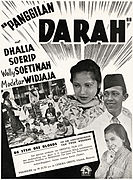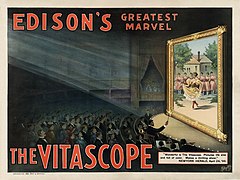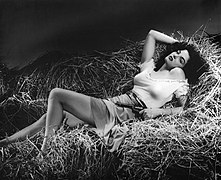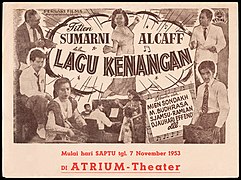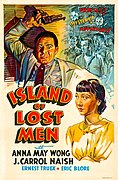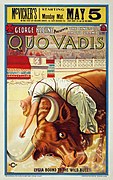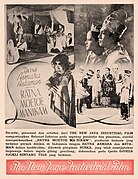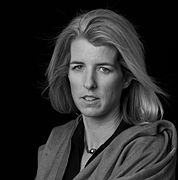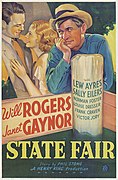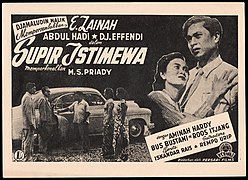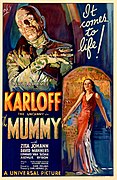Portal:Film
The Film Portal
 A film (British English) – also called a movie (American English), motion picture, moving picture, picture, photoplay or (slang) flick – is a work of visual art that simulates experiences and otherwise communicates ideas, stories, perceptions, feelings, beauty, or atmosphere through the use of moving images. These images are generally accompanied by sound and, more rarely, other sensory stimulations. The word "cinema", short for cinematography, is often used to refer to filmmaking and the film industry, and the art form that is the result of it. (Full article...)
A film (British English) – also called a movie (American English), motion picture, moving picture, picture, photoplay or (slang) flick – is a work of visual art that simulates experiences and otherwise communicates ideas, stories, perceptions, feelings, beauty, or atmosphere through the use of moving images. These images are generally accompanied by sound and, more rarely, other sensory stimulations. The word "cinema", short for cinematography, is often used to refer to filmmaking and the film industry, and the art form that is the result of it. (Full article...)
Featured articles -

Star Trek is an American science fiction media franchise that started with a television series (simply called Star Trek but now referred to as Star Trek: The Original Series) created by Gene Roddenberry. The series was first broadcast from 1966 to 1969. Since then, the Star Trek canon has expanded to include many other series, a film franchise, and other media.
The film franchise is produced by Paramount Pictures and began with Star Trek: The Motion Picture in 1979. That film and the five that followed all starred the cast of The Original Series. The seventh film, Star Trek Generations (1994), was designed to serve as a transition from the original cast to that of the next series, Star Trek: The Next Generation. The next three films just starred the cast of The Next Generation, and ended with Star Trek: Nemesis (2002), which disappointed at the box office. (Portal:Film/Featured content)
General images -
Selected image

IMAX (short for Image Maximum) is a film format created by Canada's IMAX Corporation that has the capacity to display images of far greater size and resolution than conventional film display systems. A standard IMAX screen is 22 m wide and 16.1 m high (72.6 ft x 52.8 ft), but can be larger.
Did you know...
- ... that football player Peter Bowden only started long snapping to help his cousin, a punter, produce film in high school, and both are now in the National Football League?
- ... that the Indian director Manhar Raskapur's films Mulu Manek and Kadu Makrani were both remade during the 1970s?
- ... that while filming the Doctor Who serial The Myth Makers, William Hartnell was jealous of being upstaged by the other actors?
- ... that the protagonist of Shovel Knight: King of Cards was compared to "a bad Renaissance fair actor who's gotten too far into his role"?
- ... that the BBC documentary India: The Modi Question, which examines the career of Indian prime minister Narendra Modi, was banned in India?
Selected biography -
Sir Charles Spencer Chaplin KBE (16 April 1889 – 25 December 1977) was an English comic actor, filmmaker, and composer who rose to fame in the era of silent film. He became a worldwide icon through his screen persona, the Tramp, and is considered one of the film industry's most important figures. His career spanned more than 75 years, from childhood in the Victorian era until a year before his death in 1977, and encompassed both adulation and controversy.
Chaplin's childhood in London was one of poverty and hardship. His father was absent and his mother struggled financially—he was sent to a workhouse twice before age nine. When he was 14, his mother was committed to a mental asylum. Chaplin began performing at an early age, touring music halls and later working as a stage actor and comedian. At 19, he was signed to the Fred Karno company, which took him to the United States. He was scouted for the film industry and began appearing in 1914 for Keystone Studios. He soon introduced and adopted the Tramp as his screen persona. He directed his own films and continued to hone his craft as he moved to Essanay Studios, where the Tramp persona was developed emotionally in The Tramp (1915). He then attracted a large fanbase and demanded more money as he moved to Mutual and First National corporations. By 1918, he was one of the world's well-paid and best-known figures. (Full article...)Featured lists -

Sir John Gielgud, OM, CH (/ˈɡiːlɡʊd/; 1904–2000) was an English actor and theatre director. He appeared on stage, television and radio and in film in a career that spanned eight decades. Film historian Brian McFarlane, writing for the British Film Institute, wrote of Gielgud that "in terms of the performing arts, it is no exaggeration to say that he towered over the century".
Gielgud, a member of the theatrical dynasty the Terry family, began working on stage in 1921 before attending the Royal Academy of Dramatic Art. After completing his studies he worked in repertory theatre and in the West End before establishing himself at the Old Vic in the 1930s. He continued working on the stage until 1990 both as a director and actor. Although he made some films early in his career, he did not start working regularly in the medium until he was in his sixties; in the course of just over thirty years between 1964 and 1998 he appeared in over sixty films. He was active on television and radio, appearing in numerous plays and interviews, and was also in demand as a narrator. (Full article...)
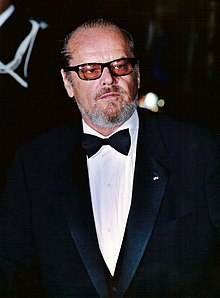
Jack Nicholson is an American actor, director, producer, and screenwriter who made his film debut in The Cry Baby Killer (1958). Nicholson is widely regarded as one of the greatest actors of his generation. He is also one of the most critically acclaimed: his 12 Academy Award nominations make him the most nominated male actor in the Academy's history. He is also a Kennedy Center Honoree and a recipient of the AFI Life Achievement Award and the Golden Globe Cecil B. DeMille Award.
In the first decade of his acting career, Nicholson had several minor roles in film and television, only having significant parts in independent films. Nicholson's breakout role was in the countercultural Easy Rider (1969). Nicholson next appeared in Five Easy Pieces (1970). He then starred in the comedy-drama Carnal Knowledge (1971). His performance in The Last Detail (1973) garnered him the Cannes Best Actor Award. For his performance in the Roman Polanski-directed Chinatown (1974), he was awarded the Golden Globe Award for Best Actor – Motion Picture Drama. He then portrayed Randle McMurphy in the Miloš Forman-directed One Flew Over the Cuckoo's Nest (1975), which won Best Picture and garnered him the Academy Award for Best Actor and Golden Globe Award for Best Actor – Motion Picture Drama. In 1976, he starred in the film adaptation of F. Scott Fitzgerald's The Last Tycoon (1941). Also that year, Nicholson costarred with Marlon Brando in the western The Missouri Breaks. In 1978, Nicholson directed and starred in another western, Goin' South. (Full article...)

Amitabh Bachchan is an Indian actor, playback singer, film producer, television host and former politician who primarily works in Hindi films. (Full article...)

Indian actress Deepika Padukone primarily appears in Hindi films. Her first screen appearance was in Himesh Reshammiya's music video "Naam Hai Tera" in 2005. Padukone made her film debut by playing the title role in the Kannada-language film Aishwarya (2006). Her first Hindi film release came the following year with Farah Khan's melodrama Om Shanti Om, in which she played dual roles opposite Shah Rukh Khan. She won the Filmfare Award for Best Female Debut for it. Her sole film role in 2008 was as one of Ranbir Kapoor's love interests in Bachna Ae Haseeno. Padukone's first film release of 2009, the kung fu comedy Chandni Chowk to China, proved to be a box office flop, but her next release, Imtiaz Ali's romance Love Aaj Kal, opposite Saif Ali Khan, was a success. Of Padukone's five film releases in 2010, only the comedy Housefull was financially profitable. The series of poorly received films continued with both her 2011 releases, Aarakshan and Desi Boyz.
The acclaimed role of an impulsive party-girl in Homi Adajania's Cocktail (2012) proved to be a breakthrough for Padukone. The year 2013 was key for Padukone when all four of her films were box office hits. Among these were two of the highest-grossing Indian films—the romantic comedies Yeh Jawaani Hai Deewani and Chennai Express. She also won the Filmfare Award for Best Actress for playing a character based on Juliet in Sanjay Leela Bhansali's tragic romance Goliyon Ki Raasleela Ram-Leela (2013). In 2014, Padukone appeared in the Tamil animation film Kochadaiiyaan and played a bar dancer in the top-grossing heist film Happy New Year. The following year, she played a headstrong daughter in Shoojit Sircar's comedy-drama Piku, which earned Padukone her second Best Actress award at Filmfare, and portrayed the warrior Mastani in Bhansali's top-grossing historical romance Bajirao Mastani. (Full article...)
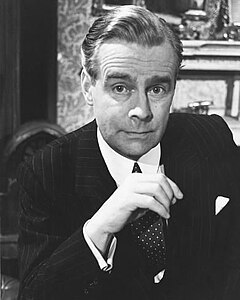
The English actor and comedian Ian Carmichael OBE (1920–2010) performed in many mediums of light entertainment, including theatre, radio, television and film. His career spanned from 1939 until his death in 2010. According to Brian McFarlane, writing for The Encyclopedia of British Film, Carmichael "epitomises the good-natured, undemanding pleasures of '50s British cinema".
Carmichael made his professional stage debut in 1939 while he was studying at the Royal Academy of Dramatic Art; his role was as a robot in the science fiction play R.U.R., which lasted for only a week. His studies were interrupted by the Second World War, and he was commissioned into the Royal Armoured Corps; he also joined an entertainment unit, 30 Corps Theatrical Pool, for which he produced twenty shows. At the end of the war he returned to professional acting, and in 1947 he took a role in She Wanted a Cream Front Door, which ran in the West End for nine months. He continued to perform in the theatre throughout the rest of his career, largely in the United Kingdom, but also in productions in Canada, South Africa and the United States. In 1947 Carmichael made his debut on television in the revue New Faces. He continued to work in television throughout his life and, according to McFarlane, achieved considerable success with P. G. Wodehouse's The World of Wooster in 1966–1967, in which he played Bertie Wooster, and as Lord Peter Wimsey between 1972 and 1975. (Full article...)
Clint Eastwood is an American film actor, director, producer, and composer. He has appeared in over 60 films. His career has spanned 65 years and began with small uncredited film roles and television appearances. Eastwood has acted in multiple television series, including the eight-season series Rawhide (1959–1965). Although he appeared in several earlier films, mostly uncredited, his breakout film role was as the Man with No Name in the Sergio Leone–directed Dollars Trilogy: A Fistful of Dollars (1964), For a Few Dollars More (1965), and The Good, the Bad and the Ugly (1966), which weren't released in the United States until 1967/68. In 1971, Eastwood made his directorial debut with Play Misty for Me. Also that year, he starred as San Francisco police inspector Harry Callahan in Dirty Harry. The film received critical acclaim, and spawned four more films: Magnum Force (1973), The Enforcer (1976), Sudden Impact (1983), and The Dead Pool (1988).
In 1973, Eastwood starred in another western, High Plains Drifter. Three years later, he starred as Confederate guerrilla and outlaw Josey Wales in The Outlaw Josey Wales. In 1978, Eastwood starred opposite an orangutan in the action-comedy Every Which Way but Loose. Although it received largely negative reviews, the film was a financial success, his highest-grossing film at that time, and generated a sequel. In 1979, Eastwood portrayed prisoner Frank Morris in the Don Siegel–directed Escape from Alcatraz. (Full article...)
Following successful screenings at the Telluride Film Festival and New York Film Festival, the film held its public premiere at the 2013 Toronto International Film Festival, where it won the People's Choice Award. Fox Searchlight Pictures initially gave the film a limited release at nineteen theaters on October 18, aimed primarily towards art house and African American patrons. The film was later given a wide release at over 1,100 theaters in the United States and Canada on November 8. 12 Years a Slave has grossed a worldwide total of over $187 million on a production budget of $20 million. As of 2019, it is McQueen's highest grossing film. Rotten Tomatoes, a review aggregator, surveyed 358 reviews and judged 95% to be positive. (Full article...)

Yash Raj Films (abbreviated as YRF) is an Indian entertainment company, established by filmmaker Yash Chopra in 1970, that produces and distributes motion pictures. As of 2022, the company has produced over 80 Hindi films and one Tamil film. YRF started a film distribution business in 1997; in addition to distributing their own productions, the company has handled the domestic and/or international distribution of over 50 films from other companies. The most frequent collaborations of the company have been with the actors Rani Mukerji, Rishi Kapoor, Shah Rukh Khan, Anushka Sharma, Katrina Kaif, and Saif Ali Khan.
YRF's first release came in 1973 with the Chopra-directed Daag, a drama about bigamy, starring Rajesh Khanna, Raakhee and Sharmila Tagore. The company had four more releases in the 1970s, including the ensemble romantic drama Kabhi Kabhie and the action film Kaala Patthar, both of which starred Amitabh Bachchan and Raakhee. YRF's sole commercial success in the 1980s was the Sridevi-starring romantic musical Chandni. The year 1995 marked the directorial debut of Chopra's elder son Aditya Chopra with the highly successful romantic drama Dilwale Dulhania Le Jayenge. Starring Shahrukh Khan and Kajol, the film has the longest theatrical run in Indian cinema history. Other successful releases of the 1990s were Darr (1993) and Dil To Pagal Hai (1997), both starring Khan. (Full article...)
The accolade for Best Long Form Music Video was first presented at the 7th Latin Grammy Awards in 2006 as a tie between Spanish recording artists Bebo and Cigala for their album Blanco y Negro En Vivo (2005) and Café Tacuba for their live album Un Viaje (2005). Three recipients of the award won with a MTV Unplugged release; Ricky Martin (2006), Julieta Venegas (2007) and Juanes (2012). Mexican singer Natalia Lafourcade holds the record of most wins in the category with three (2013, 2017, 2022). (Full article...)
News
- September 2: Tributes paid to recently deceased US actor Chadwick Boseman
- October 7: Mockumentary Mister America has world premiere
- May 16: Actor Doris Day dies at 97
- January 22: Former U.S. intelligence agent Tony Mendez, architect of 'Argo' rescue, dies at 78
- Upcoming events
WikiProjects
Selected quote
Main topics
| Filmmaking |
|---|
 |
| Glossary |
- Terms - Animation • Beta movement • Camera • Cult film • Digital cinema • Documentary film • Dubbing • Experimental film • Fan film • Film crew • Film criticism • Film festival • Film frame • Film genre • Film journals and magazines • Film industry • Film manifesto • Film stock • Film theory • Filmmaking • History of film • Independent film • Lost film • Movie star • Narrative film • Open content film • Persistence of vision • Photographic film • Propaganda • Recording medium • Special effect • Subtitles • Sound stage • Web film • World cinema
- Lists - List of basic film topics • List of film topics • List of films • List of film festivals • List of film formats • List of film series • List of film techniques • List of highest-grossing films • List of longest films by running time • List of songs based on a film or book • Lists of film source material • List of open content films
Featured content
Subcategories
Subportals
Related portals
Things you can do
- Add
{{portal|Film}}to the See also section of film-related articles. - Tag the talk pages of film related articles with the {{WikiProject Film}} banner.
- Explore the list of English language films without an article
- Check tasks and announcements at WPFILM Announcements.
- Collaborate with other participants at Wikipedia:WikiProject Film.
- Join one of the task forces at Wikipedia:WikiProject Film/Sidebar.
Associated Wikimedia
The following Wikimedia Foundation sister projects provide more on this subject:
-
Commons
Free media repository -
Wikibooks
Free textbooks and manuals -
Wikidata
Free knowledge base -
Wikinews
Free-content news -
Wikiquote
Collection of quotations -
Wikisource
Free-content library -
Wikiversity
Free learning tools -
Wiktionary
Dictionary and thesaurus
- Portals with triaged subpages from June 2018
- All portals with triaged subpages
- All portals
- Portals with no named maintainer
- Film portal
- Random portal component with 21–25 available image subpages
- Automated article-slideshow portals with 201–500 articles in article list
- Random portal component with 16–20 available subpages
- Arts portals
- Film
- Film portals
- Entertainment portals








![Image 9Louis Poyet [fr]'s engraving of the mechanism of the "fusil photographique" as published in La Nature (april 1882) (from History of film technology)](http://upload.wikimedia.org/wikipedia/commons/thumb/f/f0/Fusil_photographique_Marey2.png/120px-Fusil_photographique_Marey2.png)









































